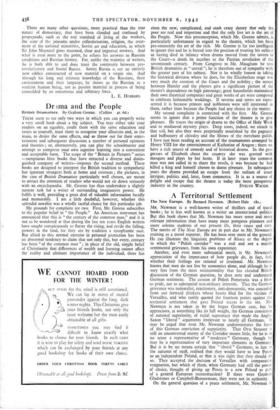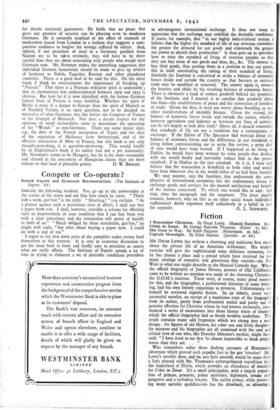A Territorial Settlement
The New Europe. By Bernard Newman. (Robert Hale. As.)
MR. NEWMAN is a well-known writer of thrillers and of travel books; he is less well known as a writer on international politics. But this book shows that Mr. Newman has more sense and more relevant information than have many more pompous planners and more solemn students of our present ills, their cause and cure. The merits of The New Europe are in part due to Mr. Newman's training as a travel reporter. He has been over most of the ground. He can illustrate the linguistic problems of Alsace or the degree to which the "Polish corridor" was a real and not a merely sentimental grievance, from his own experience.
Another, and even more substantial merit, is Mr. Newman's appreciation of the importance of how people do, in fact, feel, whether their feelings are rational or irrational. Mr. Newman knows that men do not live by economics alone, and although he is very free from the mere sentimentality that has clouded British discussion of the German question, he does note and understand German sentiment. The cession of Polish Pomerania was a blow to pride, not to substantial non-military interests. That the German grievance was nationalist, reactionary, anti-democratic' was concealed from our forward thinkers whose hearts bled for the victims of Versailles, and who rashly quoted the fourteen points against the territorial settlement that gave Poland access to the sea. Mr. Newman is not taken in by the bogus German case, but he appreciates' at something like its full weight, the German conviction of . national superiority, of racial supremacy that made the Anglo- Saxon "liberal" arguments irrelevant to nearly all Germans. It may be urged that even Mr. Newman underestimates the force of this German conviction of superiority. That Otto Strasser is still an unconverted enemy of the Corridor means little, for he is in no sense a representative of " moderate " Germany, though he may be a representative of very important elements in Germany- But it is by no means certain that " liberal " Germans, as late as the autumn of 1918, realised that they would have to lose rosen to an independent Poland, or that it was right that they should do so. They accepted the decision of Versailles with comparative resignation, but which of them, when Germany had still the power of choice, thought of giving up Posen to a new Poland as par of a general European reconstruction? If there were Oerman Gladstones or Campbell-Bannermans, they were not in authority.
On- the general question of a peace settlement, Mr. Newman is
for drastic territorial guarantees. He holds that no peace that gives any promise of security can be pleasing even to moderate Germans. He is naturally sceptical of the effect of counsels of moderation issued from London in a fashion that suggests a com- parative readiness to forgive the wrongs suffered by others. And, indeed, if our preachers of trust in a Germany purified from Nazism ars: to be talcm seriously, they will have to be more careful than they are about associating with people who would trust Germany now. Mr. Newman makes the interesting suggestion that individual German households should be made to give up articles of furniture to Polish, Yugoslav, Russian and other plundered countries. There is a good deal to be said for this. On the other hand, I think he overestimates the importance of breaking up "Prussia." That there is a Prussian militarist spirit is undeniable ; that its permanence was underestimated between 1919 and 1933 is obvious. But how far it is now identified with the former German federal State of Prussia is more doubtful. Whether the spirit of Berlin is more of a danger to Europe than the spirit of Munich or of Nazified Vienna, is an open question, not to be decided on memories of what Germany was like before the Congress of Vienna or the triumph of Bismarck. Nor does a decent respect for the opinions of small nationalities seem to necessitate the uprooting of the "Wends " as non-Germans. There are some minor slips, e.g., the date of the French occupation of Tunis and the date of the separation of Mulhouse from Switzerland, and of the effective annexation of Metz to France, but this book is not only thought-provoking, it is question-answering. This would hardly be an Englishman's book if its author had not a pet nationality. Mr. Newman's seems to be Hungary, but he is far more reasonable and shrewd in his assessment of Hungarian claims than are most visitors to that land of plausible gentry. D. W. BROGAN.



























 Previous page
Previous page